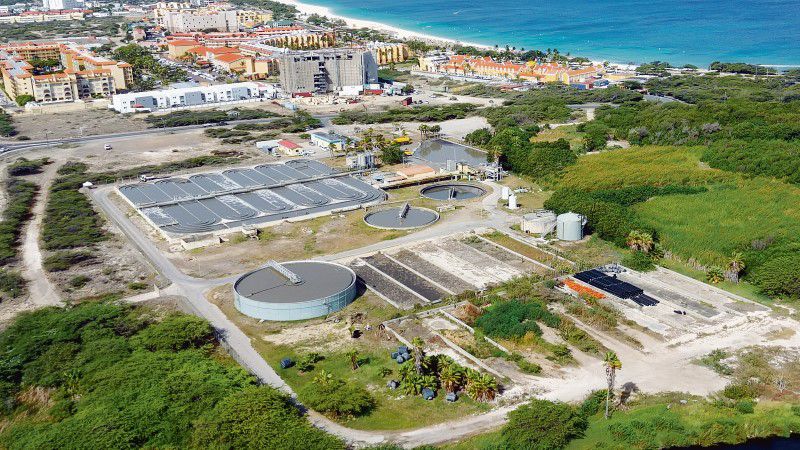Part 6 Sewage Crisis: One Resort in Court Confronting Aruba’s Government Over Sewage Mismanagement
Image: Antilliaans Dagblad
I have written several articles on Aruba’s sewage problem, which was caused by the government’s negligence over decades in adequately managing the sewage treatment plan at Bubali, known as RWZI. So far, I have used public information sources and various court decisions to find the facts and an overview of the issues. Last week, I decided to take my research or investigation up a notch, and I went to the courthouse to attend a summary proceedings hearing between Amsterdam Manor Hotel (“Resort”) and the Government and Aruba Wastewater Sustainable Solutions N.V. (“AWSS”). I didn’t take my toga with me as I was not representing any of the parties involved. I was there for you, my loyal readers. I wanted to share more than just what ends up in a court decision. I want to share what I have learned from the action in court and the heat of the moment.
Why?
The first question that comes to mind is why the resort would have to go to court again. The answer: (i) because it was necessary; (ii) because the government has failed to comply with prior decisions from the courts ordering the government to take specific corrective actions; and (iii) because it seems the government is incapable or unwilling to resolve the problem at the RWZI. This while the RWZI is a ticking time bomb of fecal matter that has already caused damage to our nature, the Resort, our reputation as a tourism destination, and our public health. On a side note, the government is also refusing to provide transparency by not disclosing various documents requested by the Resort, but that is being challenged in another court.
Penalties
I just mentioned that the government seems unwilling to resolve the issue. Mind you, the government has lost case after case to the point where it has been ordered a few times to take specific measures and keep those measures subject to penalties. Penalties are a legal instrument used by the court to put “teeth” to a decision to make sure the order is complied with. Any government that respects the rule of law would not have to be subjected to penalties but would respect and calmly with court orders. It is not our government; our government would rather spend public funds on paying penalties than complying. If my math in court were correct, the government would have paid over AFL. 700K in penalties so far. A little under US$ 400k. In terms of the government’s annual income, this is, of course, peanuts. The issue is that the government should comply with court decisions even if no penalties are ordered. The problem is that (i) the government doesn’t care as long it is not a politically sensitive issue, and (ii) the government has been known to and has no problem purposely ignoring a decision from the court as long as it can accomplish its political agenda. Shameful and tasteless!
Recusing a judge
With this knowledge and facts, it is incomprehensible that a few days before the Resort’s case, one Vivian Emerencia, acting as attorney-in-fact for the government’s legal department (DJZ), had the gall to file a motion to recuse a judge in the middle of the hearing when the judge commented that he had seen government put court decisions aside if no penalties are imposed! While every party in civil proceedings is entitled to file a motion to recuse a judge, even the government, I can tell you that another attorney-in-fact for the same government’s legal department, Yvonne Kaarsbaan, in the Resort case admitted in court that the government had not complied with one or more decisions. So, when does making a statement of fact constitute grounds for recusal? I – and this is nothing more than my personal and professional opinion as a legal practitioner with 26 years of appearing in front of the bench – find the motion in question misplaced, unfounded, misuse of procedural rules, and a blatant insult to the integrity of the Court of First Instance of Aruba. The recusal chamber of the Appellate Court will (or has already) reviewed(ed) the claim and should rule on the recusal matter in the days to come.
The positions in court
The summary proceedings hearing took place on Tuesday, April 9th. Present were the judge, the clerk, the parties, various civil servants, including the director of the DOW, some press, and yours truly. Mind you; this is the fifth or sixth summary proceedings that the resort has initiated after the government repeatedly failed to comply with orders issued. This causes the judge to have to follow the facts and previously issued orders. In doing so, it is unequivocally clear that the government is committing a tort against the Resort. The arguments presented by the government that the resort had no urgent need for an intervention or that no tort was likely in vain. As a litigator, you are at times best served by acknowledging specific facts or merits of a case instead of arguing the contrary. If you do the latter, your credibility will likely suffer in the bench’s eyes. Against this background, the defense by the government was mainly limited to generalities and formal arguments, which seemed unimpressive. Another “key” defense of the government came across as: “Your Honor, the dog ate my RWZI homework and has been eating my homework for the past 20 years.” I know that line didn’t work well for my pals and me in elementary school, and I doubt it will work for the government.
The Resort presented the history, the facts, the non-compliance of the government, and a list of thought-out measures based on expert advice to be ordered and to be implemented. Remarkably enough, neither the government nor the AWWS objected to or argued against every single demand. Odd, one would say. In such a case, a civil summary proceeding is free to deem waived any unchallenged part of the claim and be ready awarded the demands. Instead, the judge gave the government a “helping hand” by going down the list and asking the parties questions about every item. Probably to ensure the court understood the technical aspects. In this open court dialogue discussion, the Resort explained each requested measure. Its attorney, Patrick Brown, and the Resort’s owner/general manager, Jurgen van Schaijk, did this in a clear and methodical way. They explained what they mean by each and why it is necessary and emphasized that the solution required a holistic approach; You can’t just implement one or two of these things; they all need to happen simultaneously.
From the government’s side, one of the civil servants primarily responsible for the operations and maintenance, Darryl Lue from DOW, admitted in most cases that the requested measures are possible and will work. He even agreed that a technical solution for aeration (oxygenation of the sewage) was on point. These measures all or mostly come from the same Dutch experts that the Government has employed over the years. He said some of these would be a viable alternative for certain RWZI elements that are now worn out and, more often than not, not in operation. These not being in operation is a violation of a previous court order. These are the so-called “brush aerators.” The director of the DOW, Marlon Croes, stepped up to the speakers’ stand. What he said was a bit of an understatement. He noted that the RWZI is old and not functioning up to par. Everybody in the courtroom already knew that, and the whole island did. Did he think repeating it would work like a magic bullet and sway the court? The plant was also old and tired in the previous cases, which didn’t save the government then. I don’t see it saving the day this time around, either. He says DOW can’t get the plant (the “existing old” plant) to work correctly and at capacity. It seemed (to me) that DOW is saying:
“We have not done the right job operating and maintaining this thing, regardless of whether we had funding. We are unwilling to spend money on our budget or staffing because AWWS will soon take over, and we will no longer be responsible. We pray soon we will be off the hook for this one, and meanwhile, it’s too bad for the resort. Too bad for the community. Too bad for the tourists. They all will just have to deal with the situation”.
The word situation is code for dealing with the feces, the stench in the air, the flies, the dead or dying coral, the pollution of our sea, and the risk to our public health and our well-being, just to mention a few unimportant things to the DOW and the government. The court even questioned the DOW. What is the plan? What are you going to do? The problem has existed for decades, and you cannot articulate a concrete solution apart from privatizing the matter. Privatizing from a government operation to an operation by a government-owned or controlled entity, i.e., AWWS, may be merely kicking the tin can down the road.
AWSS
Meanwhile, AWSS was reluctant to take responsibility or ownership of the RWI plant or any related issue in court. It is still waiting for the laws to pass to see what, if any, its role will be. I couldn’t help but visualize AWWs standing at the edge of the diving board, with toes firmly curled over the brink and with no intention of making the plunge. So, it doesn’t seem like we can bank on AWWS for much anytime soon. Nevertheless, I was glad to see young attorney Brandon Croes appear in court under the guidance of Anthony Ruiz and show his litigation skills. The kid certainly has a promising future. His late father is certainly watching proudly from above.
The victim
The victim in this case, or perhaps the unsung hero, is the Resort or its owner and general manager. The Resort is losing revenue due to the RWZI breakdown. It/he is spending money on engineers and other experts to proactively provide technical solutions for the problem, using the same private experts engaged by the government with the knowledge and know-how to deal with the RWZI. The solution is not rocket science, but as long as the government is willing to invest in the plant, the DOWs or the AWWSs of the world will not be able to resolve something, and the sewage saga will continue.
The funding
In a earlier columns, I questioned the method of financing that the government had envisioned, which would be some tax, levy, or charge charged at the border via the immigration’s ED- card. It was supposed to be $35 per tourist. The State Council raised many questions about this structure and the draft law. The money collected was to be allocated (somehow) to fund AWSS. I had mentioned that this funding plan was flawed or, at the very least, questionable. This is partly because the tourists already paid an environmental levy on their hotel or timeshare bill of US$ 3 per night. US$ 25 per night for the alternative locations (AirBnB).
Environmental levy, after all
Now I hear that the ED-card scheme is being replaced with, wait for it, the environmental levy. This levy would have to be increased threefold or fourfold to cover the initial CAPEX and OPEX of the “AWWS-solution,” whatever that might be, and if that solution works. This increase will not go well with the hotels, making Aruba even more expensive as a tourism destination. Because of this radical change, I would expect the draft law to go back to the State Council for review before it goes on to the floor of the parliament. Otherwise, the draft legislation would be rushed and incomplete with all the risks of such hasty action.
The court of last resort
Because of this, it is now more critical than ever for the Court of First Instance to take steps to protect the Resort and the community by order as the Resort demands. Waiting for or relying on the government and legislature is not realistic. In a case I was involved in a few weeks ago, the judge mentioned that he was confident that the government would not let a specific critical function in our education system be abandoned or disregarded. My partner and I simultaneously responded that he had far more confidence in the government than we did. In 2022, the government removed close to US$ 10M from the annual budget allocated to the regular and past-due maintenance of RWZI and to invest in new equipment. Available money that could have been used to address the situation. With one strike of the pens, the government removed that line item from the approved budget, and that money was gone. The privatization was supposed to take place in 2022. We are in 2024 with a draft legislation that had been changed after the State Council reviewed it. We are lucky if a law is passed in the next 12 months. With the election on, looking at the latest in September 2025, it is foreseeable that no law will be passed Rather, the problem will be passed along for the next government to deal with. Hence, we must bank on the court to order the following steps to help bridge the situation. Others within the government, like the minister of health and tourism, ATA, Serlimar, and the entire Council of Ministers, must step up to the plate and accept the responsibility to find and execute a solution. Not just the DOW and poor (shaky) AWWS.
No new sewage access.
Let me leave you with this while I can write another few pages on this case and this topic. The Resort had asked the court to order the government not to allow any other residential projects or new hotels to connect to the current RWZI. I couldn’t agree more with this measure. This is necessary. Hotels opening soon, like the Iberostar, the St. Regis – I like this flag, the recently opened Embassy Suites, and any new condominium projects, should be required to process their sewage on-site and recycle their waste. The RWZI simply can’t handle the additional toilet flushing! They should not be allowed to connect to the RWZI for now and, ideally, should never be allowed to connect. The same applies to the expansion of existing hotels. Hotel owners and investors should know that the government cannot manage the sewage. They should implement their on-site sewage system as good corporate citizens and not wait for the government to require them. Adding to the sewage and later complaining about it is also not the solution. If more hotels and condominiums process their sewage on-site, it will relieve the pressure on the RWZI while the government scrambles to find a solution before 2030 or before a major sewage and tourism disaster!














